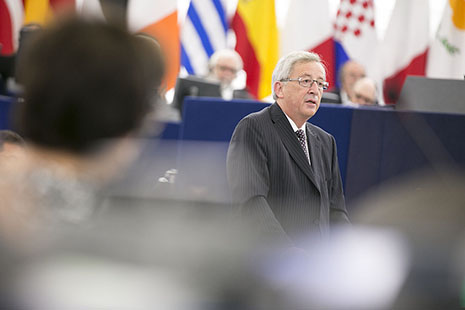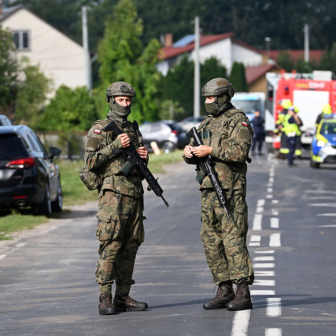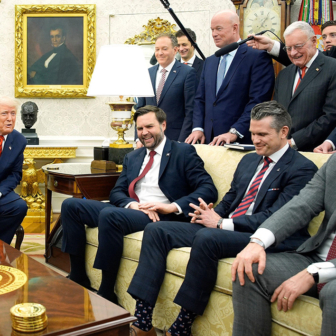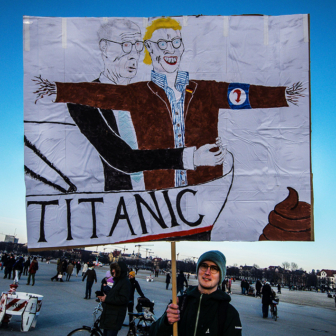If the political debates leading up to May’s European parliamentary elections failed to live up to expectations, it was probably because expectations had been set too high. The televised clashes were billed as the defining moment in the evolution of EU democracy, finally giving voters the chance to vet and select candidates for the European Union’s key decision-making body. What viewers got instead was a group of ageing party insiders fighting valiantly to rise above their CVs and offer Europe a much-needed sense of purpose.
Whatever the merits of the candidates who took to the stage in Maastricht on 28 April, they were never destined to embody cultural change. Socialist powerbroker and president of the European Parliament Martin Schulz came across as grumpy; conservative Jean-Claude Juncker, who led the international tax haven that is Luxembourg between 1995 and 2013, was so disengaged he seemed set to slip into a coma; Liberal Guy Verhofstadt, who spent nine years as the prime minister of Belgium, managed to squeeze in all the outrageous soundbites you would expect from someone not polling well enough to have much to lose. The only candidate with a legitimate claim to outsider status was Greens parliamentarian Ska Keller, but she often appeared out of her depth.
The debate would have disappointed even the most committed EU political junkie (of which there is no shortage in this town). To make things worse, the broadcast was hosted by two journalists so obsessed by the carefully timed American question-and-answer format that interesting comments weren’t followed up and candidates were left to sidestep issues unchallenged. On the rare occasions when the debate did take off the hosts brought it all crashing down again by reading out live tweets which, stripped of their smartarsed hashtags, had remarkably little to say.
Yet as oversold as this clash of party-backed dinosaurs may have been, it would be wrong to assume it was not a genuinely historic moment. The fact that candidates were now having to face the electorate’s hashtags – or even that they were candidates in the first place – was a direct result of a concerted attempt at political reform.
The wide-ranging Lisbon Treaty was adopted by European leaders in 2007 (and brought into effect in 2009) to address concerns that the European Union’s institutions lacked democratic legitimacy. It was a prescient move: questions about institutional legitimacy have become a central part of the wave of euroscepticism sweeping the continent.
At the centre of the debate is the European Commission, the executive arm of the European Union. It is this Brussels-based body, not the European Parliament, that drafts most EU legislation. Until now, the president of the Commission – the top EU minister – has been chosen by a cabal of leaders from the twenty-eight member states, meeting behind closed doors and horse-trading executive positions and agency leadership roles until an agreement was reached. No matter whom they chose, the outcome was always the same: the Commission president was very much the creature of the member states.
The selection process weakened the independence of the European Union’s executive and its leadership. The political timidity of the current president, the Portuguese José Manuel Barroso, is seen as emblematic of the problem. The best line of the anodyne leaders’ debates came from Verhofstadt, who said that “what Mr Barroso does is to first phone Paris, then Berlin – actually, usually it’s the other way, first Berlin then Paris – and it’s only when he gets the green light from those two countries that he dares present something...” Whatever the precise layout of the president’s rolodex, there is little doubt that Barroso has tiptoed around member-state sensitivities, granting EU governments a disruptive level of influence over the executive.
In strictly legal terms, the Lisbon Treaty left the final choice of the Commission president firmly in the hands of the European Council, the super-Senate that represents member states. But the wording of the treaty’s Article 18 placed the European Parliament, the only directly elected EU institution, at the centre of the action. Here’s what the Treaty has to say: “Taking into account the elections to the European Parliament and after having held the appropriate consultations, the European Council, acting by a qualified majority, shall propose to the European Parliament a candidate for President of the Commission.”
You don’t have to be a constitutional lawyer to realise that “taking into account” can mean anything. Would the Council now be obliged to give the gig to a candidate put forward by the political party with the most elected members on the floor of parliament? Or should the job go to a leader who managed to cobble together the largest coalition? Or did it simply mean that if, say, the centre-right ended up with the most votes, then the Council could appoint anyone it wanted with a centre-right pedigree (the name of International Monetary Fund Managing Director Christine Lagarde, a former French finance minister, was put forward in that context)?
For the political parties in the European Parliament, the Treaty’s flimsy wording seemed like a rare opportunity to wrest power from the Council. Rather than engage in soul-searching about what the treaty really meant, the parties opted to put forward their candidates ahead of the May 2014 parliamentary elections, running an outrageously presidential style of campaign, complete with candidate posters and promotional videos.
So, while the Council was under no legal obligation to appoint the leader whose party emerged victorious from the elections, the campaign itself began to give the candidates a stature and legitimacy that the letter of Article 18 did not. With every TV debate, every campaign stop and every criticism of the Council, those who became known as the spitzenkandidaten (the “lead candidates” in German) were forging a bond with the electorate that would be difficult to sever. Justified or not, it was a well-executed power-grab on the part of the European Parliament.
The candidates knew what they were doing and piled on the pressure: in a rare moment of agreement during an English-language debate they said that one of them would definitely be the next Commission president and vowed to support whoever emerged with the most votes. What’s more, if the Council attempted to impose a non-spitzenkandidat then Parliament would retaliate by voting down the appointment (the European Parliament has the power to veto the Council’s choice). In short: a Council-backed outsider would see party leaders take to the steps of Parliament for their “Well may we say God save the Queen” moment: it would be a political and institutional crisis.
The Council was in a bind: its moral authority in selecting the Commission president had been snatched, yet it had serious reservations about the two spitzenkandidaten who actually stood a chance of winning: Juncker and Schulz. The question quickly became one of political pragmatism: could the Council afford to thumb its nose at Parliament and its electorate?
After the poll, in which the conservative European People’s Party emerged the clear winner, German chancellor Angela Merkel expressed “deep doubts” about Juncker. Her comments quickly unleashed a political backlash from all sides of politics in Germany, prompting her to backpedal and throw her support behind him – a line she stuck to right up to his appointment this week.
This is when British prime minister David Cameron arrived on the scene. Having received a drubbing at the hands of the eurosceptic UK Independence Party, or UKIP, whose 27 per cent of the vote exceeded that of both Cameron’s Conservatives and the opposition Labour Party, the prime minister was under political pressure to respond. He did so by launching a scathing attack on Juncker’s candidacy. It was “profoundly wrong,” he said, because Juncker had been “at the heart of the project to increase the power of Brussels and to reduce the power of nation-states for his entire working life.”
More importantly, though, Cameron said he objected to the whole spitzenkandidaten system, arguing “it was not right for the elected heads of government of the European countries to give up their right to nominate the head of the European Commission – the most important role in Europe.”
Cameron’s anti-Juncker campaign wreaked havoc on the European Council and ultimately earned him no kudos back home. As things transpired, only Britain and Hungary voted against Juncker at the 27 June meeting in Brussels, the first time the Commission presidency had gone to a vote rather than be resolved by consensus. But it was Cameron’s outburst against the spitzenkandidaten system, which for better or worse had injected an element of genuine democracy into the appointment, that puzzled some observers.
Of course, many European leaders – including Merkel – would have agreed with Cameron that Juncker was not the fresh start the European Union needed as it teetered under the weight of the eurosceptic vote. Yet to argue that the Council, representing the governments of member states, had greater democratic legitimacy than the directly elected Parliament was a long bow. What’s more, the Lisbon Treaty – which Britain had ratified in 2008 – had unequivocally assigned a role to Parliament in the appointment of the Commission president. For Cameron to express surprise about how the spitzenkandidaten system had developed appeared disingenuous.
More broadly, though, Cameron’s eleventh-hour intervention was viewed with real concern in countries that had met the advance of eurosceptic parties more constructively – among them Germany, Finland, Italy and the Baltic states. It was quickly noted that before the election Cameron had not expended much political capital in defending the European Union from even the most outrageous UKIP attacks. In fact, the most prominent Briton with something positive to say about Europe was Scotland’s first minister Alex Salmon, who made a flying visit to Bruges in the dying days of the campaign to argue that anti-European England was forcing pro-European Scotland out of the European Union against its will (something which only Scottish independence would remedy).
But at the heart of Cameron’s bruising clash with the spitzenkandidaten is a deeper question about the role of the European Union’s political parties. Whenever there is a political void, parties are the ones with the manpower and the know-how to fill it. And what many outside observers fail to grasp is that political parties in continental Europe are deeply conservative, in the true meaning of the word: they are dominated by industry, trade unions, religious groupings and a wide variety of powerful voices with an interest in maintaining the status quo. The candidates European parties produce are politicians who have emerged by either serving or working alongside the institutions – not by reforming them.
So while British politicians evaluate all EU policies on the basis of how much power they grant Brussels (and, by implication, take away from Westminster) the real issue for the Union’s future is actually a more complex one about how to reform its institutions. It is tempting to champion the European Parliament’s democratic legitimacy, but handing over power to political parties (which is what the spitzenkandidaten process did) is not a panacea. Nor will a legitimacy contest between directly elected members of Parliament and twenty-eight national leaders who have themselves been elected in their home countries see either side emerge a clear winner. Reform is the biggest challenge facing the European Union. •




